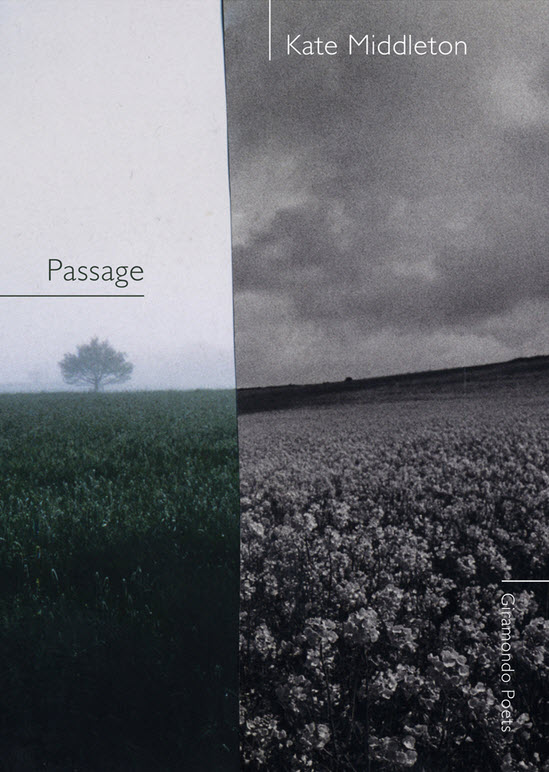
Passage by Kate Middleton
Giramondo Publishing, 2017
In the prefatory poem titled ‘Lyric’, Kate Middleton writes of ‘Voices torn, / pieced, re-sewn’, a phrase that neatly captures the allusive texture and patchwork procedures of her third collection Passage. The volume is replete with centos and erasures, that is to say, modes of vicarious composition that sing ‘by song’s own mesh of I/ of we’. Its keynote is perhaps provided by that innocuous preposition ‘after’ which occurs in the subtitle to so many of the poems (‘Lyric’ is itself ‘after Dan Beachy-Quick’ and begins with a quotation from his 2008 essay collection, A Whaler’s Dictionary). For Middleton is above all a poet of second sight, of the revisionary afterimage; a connoisseur of the residual intimacies that survive in photographs and paintings, the recesses of the body, and the ruins of a landscape.
Like Middleton’s last effort Ephemeral Waters (2013), a book-length paean to the Colorado River, Passage is primarily concerned with questions of travel and proceeds by juxtaposing human scales of movement and growth with animal or ecological ones. In the title poem, bowhead whales from the Pacific and the Atlantic are imagined reuniting in the Northwest Passage, a fabled sea-route through the Canadian Arctic Archipelago now being thawed out by global warming as well as the site of a fatal expedition led by Sir John Franklin in 1845. Middleton establishes an arresting parallelism between the ‘century-old grazes’ sustained by the whales at the hands of nineteenth-century whalers – ’the jade, the slate, the ivory/ sharps/ lodged in blubber’ – and the ‘starvation; hypothermia; lead/ poisoning;/ scurvy; dread consumption’ suffered by the explorers who ate food from lead-soldered cans and possibly each other in their last days. But the poem’s pathos derives less from the record of an historic failure than the lapsing of a legend of human hubris. It seems to ask delicately: what will become of stories like the Franklin expedition (or even the Titanic) once the polar ice caps have melted away?
Voyages have afterlives; as stories of survival, they themselves live on in strange and unexpected places, picking up what Middleton had called in an early poem a ‘mythological second-wind’ (‘What is in this bird?-’ from 2009’s Fire Season). ‘The Queen’s Ocean’ reminds us of the solace that the Journals of Captain James Cook provided Marie Antoinette as she awaited execution:
her imagination roved beyond the cell, beyond the Conciergerie, tiptoed slipshod up to the waves she could not quite picture—at Calais, at Le Havre, at Brest, at Point-de-Grave— and finally beyond. (10)
The lines dramatise the appeal of travel writing for the sequestered monarch – an appeal that depends both on the romance of naming and an encounter with the unnameable (like ‘after,’ ‘beyond’ is another preposition that attains nominal force). In such poems, Middleton shows an instinct for the representative moment, the wider world-historical shift writ small, and just as ‘Passage’ deals with global warming without making heavy weather of it, ‘The Queen’s Ocean’ delivers an elegy to the Enlightenment in which the nominalization of the world through imperial voyages of discovery is counterpointed by the de-nominalisation of the ancien regime nobles (‘The Queen’ become ‘the Widow Capet’ become ‘Prisoner 250’).
Names, of course, proliferate throughout a volume in which Middleton summons up a whole host of tutelary spirits whose words she has fused into unforeseen eloquence: from contemporaries such as Luke Carman, Siri Hustvedt, and Eliot Weinberger, to golden oldies such as William Tyndale and Sir John Mandeville, to the lost-and-founds such as Isabelle Eberhardt (an early twentieth-century Swiss explorer and diarist who converted to Islam) and S P B Mais (once dubbed ‘the Modern Columbus’ by the BBC, though probably more accurately thought of as the Robert Macfarlane of the interwar period). Mais is the most conspicuous presence as Middleton ‘gleans’ (as she puts it in the helpful ‘Notes’ section) a series of erasure poems from his 1932 radio broadcasts titled This Unknown Island. Not much of the cosy self-recognition that Mais conjured up for his audience is left after Middleton’s alchemy of omission:
Think of home. The home of your ancestors. Of sun
and a child’s alphabet. A Lilliput of words and meadows.
Blast it with dynamite. (20)
When placed alongside the centos, certain patterns emerge: Middleton’s telegraphic compressions have a tendency to turn matter-of-fact indicatives or coaxing interrogatives into bracing imperatives; the physical strenuousness of Wanderlust often gets transmuted into the moral strenuousness of spiritual allegory. But these compositions retain the joy of chancing upon something half-invented and half-discovered that seems to have animated Mais’s travelogues in the first place (the England he sets out to find having already been prepared for him by Emily Brontë or Thomas Hardy or Arthurian legend).
On the whole, however, Passage is distinguished less by its continual textual gambits than by its absorbing appreciation for all that is singular. What Middleton has assembled here is nothing short of a cabinet of curiosities: a piece of gravel from Plovdiv, the oldest living land animal, the Chimera of Arezzo, a gynandromorph butterfly, the regenerative heart of a day-old mouse, the verb ‘guddle’. One comes away from this collection charmed and grateful to have been able to read and ‘reread the riotous colour of grace’.









